江苏省永丰初级中学:Unit 3 Asia (1)教案(牛津译林版九年级下册)
江苏省永丰初级中学英语牛津译林版九年级下册Unit3 教案
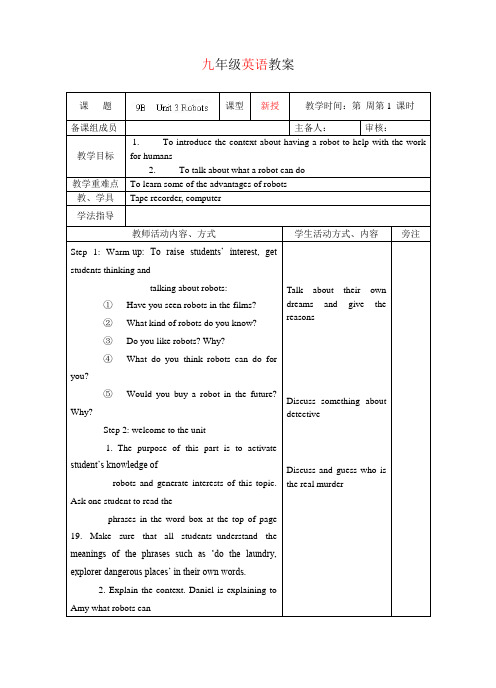
Step 2: welcome to the unit
1. The purpose of this part is to activate student’s knowledge of
robots and generate interests of this topic. Ask one student to read the
Listen to the tape and find sth about Eddie
教后记:
九年级英语教案
课题
9B Unit 3 robots
课型
新授
教学时间:第周第2课时
备课组成员
主备人:
审核:
教学目标
1. To introduce the context about having a robot to help with the work for humans
Discuss and guess who is the real murder
Listen to tape and answer the questions
After learning some vocabulary about describing a person, try to describe a friend of theirs by themselves
1. Recite the useful vocabulary and comic strip.
2. Complete some exercise.
3. Preview reading(1)
ory
Talk about their own dreams and give the reasons
牛津译林版英语九下《Unit 3 Asia》word学案
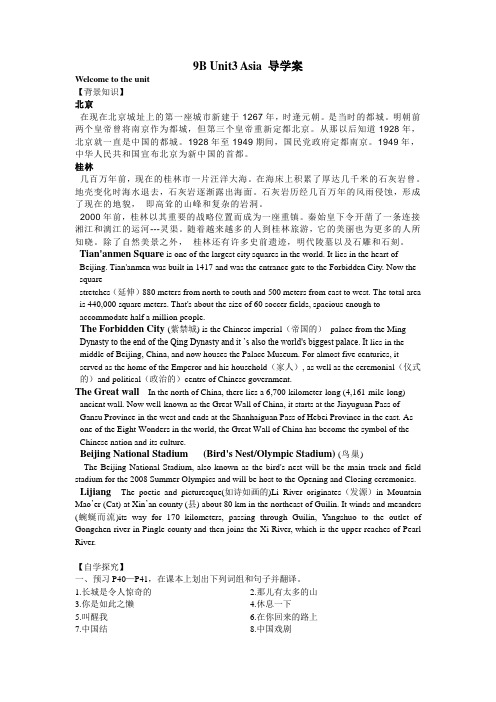
9B Unit3 Asia 导学案Welcome to the unit【背景知识】北京在现在北京城址上的第一座城市新建于1267年,时逢元朝。
是当时的都城。
明朝前两个皇帝曾将南京作为都城,但第三个皇帝重新定都北京。
从那以后知道1928年,北京就一直是中国的都城。
1928年至1949期间,国民党政府定都南京。
1949年,中华人民共和国宣布北京为新中国的首都。
桂林几百万年前,现在的桂林市一片汪洋大海。
在海床上积累了厚达几千米的石灰岩曾。
地壳变化时海水退去,石灰岩逐渐露出海面。
石灰岩历经几百万年的风雨侵蚀,形成了现在的地貌,即高耸的山峰和复杂的岩洞。
2000年前,桂林以其重要的战略位置而成为一座重镇。
秦始皇下令开凿了一条连接湘江和漓江的运河---灵渠。
随着越来越多的人到桂林旅游,它的美丽也为更多的人所知晓。
除了自然美景之外,桂林还有许多史前遗迹,明代陵墓以及石雕和石刻。
Tian'anmen Square is one of the largest city squares in the world. It lies in the heart of Beijing. Tian'anmen was built in 1417 and was the entrance gate to the Forbidden City. Now the squarestretches(延伸)880 meters from north to south and 500 meters from east to west. The total area is 440,000 square meters. That's about the size of 60 soccer fields, spacious enough to accommodate half a million people.The Forbidden City (紫禁城) is the Chinese imperial(帝国的)palace from the Ming Dynasty to the end of the Qing Dynasty and it ’s also the world's biggest palace. It lies in the middle of Beijing, China, and now houses the Palace Museum. For almost five centuries, it served as the home of the Emperor and his household(家人), as well as the ceremonial(仪式的)and political(政治的)centre of Chinese government.The Great wall In the north of China, there lies a 6,700-kilometer-long (4,161-mile-long) ancient wall. Now well-known as the Great Wall of China, it starts at the Jiayuguan Pass of Gansu Province in the west and ends at the Shanhaiguan Pass of Hebei Province in the east. As one of the Eight Wonders in the world, the Great Wall of China has become the symbol of the Chinese nation and its culture.Beijing National Stadium (Bird's Nest/Olympic Stadium) (鸟巢)The Beijing National Stadium, also known as the bird's nest will be the main track and field stadium for the 2008 Summer Olympics and will be host to the Opening and Closing ceremonies. Lijiang The poetic and picturesque(如诗如画的)Li River originates(发源)in Mountain Mao’er (Cat) at Xin’an county (县) about 80 km in the northeast of Guilin. It winds and meanders (蜿蜒而流)its way for 170 kilometers, passing through Guilin, Yangshuo to the outlet of Gongchen river in Pingle county and then joins the Xi River, which is the upper reaches of Pearl River.【自学探究】一、预习P40—P41,在课本上划出下列词组和句子并翻译。
unit3《asia》教案1(牛津英语初三下)doc初中英语
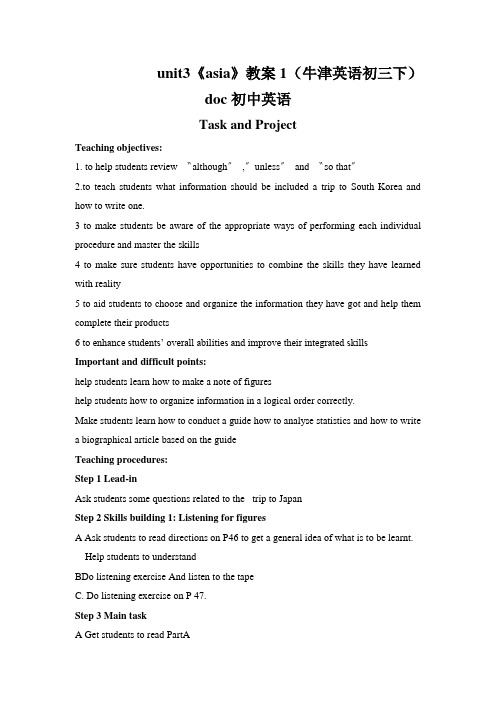
unit3《asia》教案1(牛津英语初三下)doc初中英语Task and ProjectTeaching objectives:1. to help students review 〝although〞,〞unless〞and 〝so that〞2.to teach students what information should be included a trip to South Korea and how to write one.3 to make students be aware of the appropriate ways of performing each individual procedure and master the skills4 to make sure students have opportunities to combine the skills they have learned with reality5 to aid students to choose and organize the information they have got and help them complete their products6 to enhance students’ overall abilities and improve their integrated skillsImportant and difficult points:help students learn how to make a note of figureshelp students how to organize information in a logical order correctly.Make students learn how to conduct a guide how to analyse statistics and how to write a biographical article based on the guideTeaching procedures:Step 1 Lead-inAsk students some questions related to the trip to JapanStep 2 Skills building 1: Listening for figuresA Ask students to read directions on P46 to get a general idea of what is to be learnt. Help students to understandBDo listening exercise And listen to the tapeC. Do listening exercise on P 47.Step 3 Main taskA Get students to read PartAB. Finish Exercise on P 49 Part A2C. Do Part BStep 4 ProjectHelp students review as many jobs as possibleTalk about Asian countryAccomplish some reading tasks, dealing with some language points. Step 5 HomeworkFinish all the homework in Unit 3.。
unit3asia教案3牛津英语九年级下
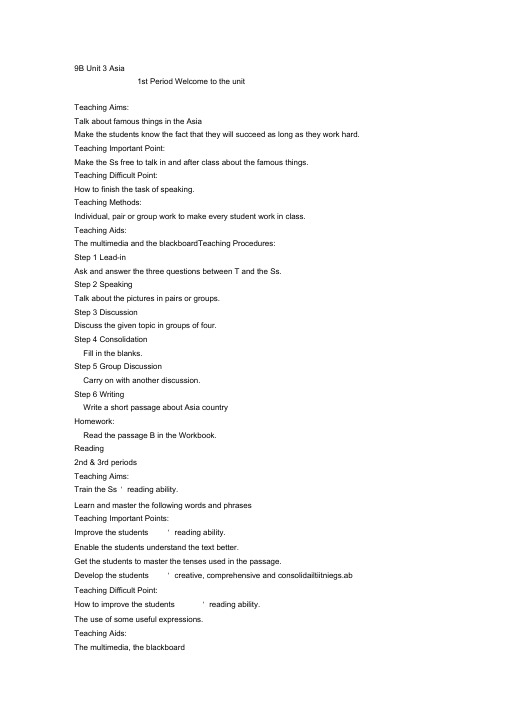
9B Unit 3 Asia1st Period Welcome to the unitTeaching Aims:Talk about famous things in the AsiaMake the students know the fact that they will succeed as long as they work hard. Teaching Important Point:Make the Ss free to talk in and after class about the famous things.Teaching Difficult Point:How to finish the task of speaking.Teaching Methods:Individual, pair or group work to make every student work in class.Teaching Aids:The multimedia and the blackboardTeaching Procedures:Step 1 Lead-inAsk and answer the three questions between T and the Ss.Step 2 SpeakingTalk about the pictures in pairs or groups.Step 3 DiscussionDiscuss the given topic in groups of four.Step 4 ConsolidationFill in the blanks.Step 5 Group DiscussionCarry on with another discussion.Step 6 WritingWrite a short passage about Asia countryHomework:Read the passage B in the Workbook.Reading2nd & 3rd periodsTeaching Aims:Train the Ss ' reading ability.Learn and master the following words and phrasesTeaching Important Points:Improve the students ' reading ability.Enable the students understand the text better.Get the students to master the tenses used in the passage.Develop the students ' creative, comprehensive and consolidailtiitniegs.ab Teaching Difficult Point:How to improve the students ' reading ability.The use of some useful expressions.Teaching Aids:The multimedia, the blackboardTeaching procedures:Step 1 RevisionAsk one or two students to read Asia Step 2 Lead-inAnswer T these questions. Step 3 Reading Comprehension Fast reading finish Part B. Detailed reading do C. Finish D &E.Step 4 Consolidation Discuss Part F Step 5 Language PointsHomework:Write a summary about Howard Carter Finish the relative exercises in the Workbook.. Period 4 VocabularyTeaching Aims:Improve the students ' speaking abilityEnlarge the students ' vocabularyGet the students to know more about national flags Teaching Important Points :Make the students talk about national flags freely Learn the words by heart and try to use them Teaching Different points:How to develop the students ' imaginationHow to use the new words to solve problems Teaching Methods:Talking to improve the students ' speaking ability Practice to get the students to master what they' ve learntDiscussion to make every student work in class Teaching Aids the multimedia the blackboard Teaching Procedures Step1 Revision and Lead-inBrainstorming Show some pictures and ask Do you know flags? What other flags do you know? Step 2 Complete part AAnswersStep3 Complete part B Step4 DiscussionI like ______ (flags)because ______________________________Step5 HomeworkRemember the words learnedPreview Grammar and usagePeriod 5 Grammar (the first period)Teaching Aims:Learn “ although ” , ” unless ” and “ so that ”Compare the use of themTeaching Points:How to use themTeaching Methods:1 Inductive method2 Comparative methodTeaching Aids:1 a multimedia2 a blackboardTeaching Procedures:Step 1 Revision Guessing gameDo you know any flags? Use your body language to show flags and ask your partner to guess.Step 2 Lead-in Fill in the blanks with proper tenses.What did you do yesterday?I enjoy shopping in the supermarket. Yesterday evening, I ______ ( go )shopping near my home.I _____ (be) busy all day long. So it ____ (be)a good chance for me to relax myself.There ____ (be)many people in the supermarket. Since I _____________ (have) enough time, I (feel) at ease. I (walk) here and there to see whether there (be) something I need. I (fill)my basket with all the goods I chose.I _____ (take) all my things with me.I _____ (decide) to go home by taxi.At the moment, a guide( 保安) ____ (stop) me and ___ (tell) me that I _____ (not pay). I felt very sorry that I _____ (forget) it. I said I ____ (think) I ____ (do) it before I came out of the door.Step 3 Structure1. although 的用法although 意思相当于though( 尽管,虽然),用来引导让步状语从句。
江苏省永丰初级中学:Unit 3 Asia (Main Task & Checkout)课件(牛津译林版九年级下册)
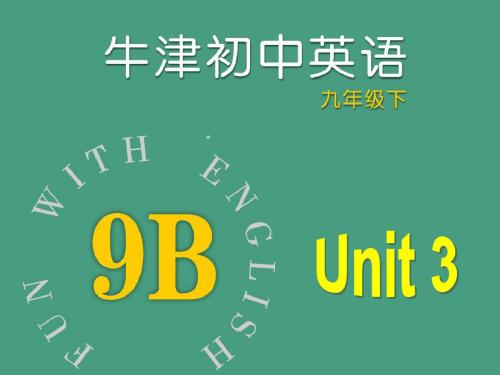
and it just takes about _______. 2 hours
People in South Korea speak ________, Korean but some of them may also understand Chinese and _______. English
Sentosa(圣淘沙岛)
The Jurong Bird Park
(裕廊飞禽园)
The night Safari
(夜间野生动物园)
Singapore
Singapore is a great country to visit. Singapore has one main island and many smaller islands. You can go there by air and it takes about seven hours from Beijing. Most people in Singapore speak English, some also speak Chinese and Malay. The currency there is the Singapore dollar.
w
A trip to South Korea
Seoul
South Korea
South Korean won
South Korean
Gyeongbokgung Palace
1988 Seoul Olympic Games
Lotte World
Myeongdong Shopping District
The currency used there is the
_________________. South Korean won It is easy to exchange your money in the banks in Beijing.
苏教牛津译林版初中英语九年级下册《Unit 3 Asia》Grammar 1教学案

苏教牛津译林初中英语重点知识精选掌握英语语法知识,巩固词汇量和各种语态,学好英语基础一定要扎实,大家一起练习吧!牛津译林初中英语和你一起共同进步学业有成!Unit 3 AsiaCompare the usGet the students to know more about the abilities们还是决定买。
②there然我们看见空气,空气却存在于我们的周围。
③although定意义,相当于。
注意:条件状语从句,与其它时间状语从句一样,用一般现在时代替将来时。
Unle ss: conj.Step 3 How dothat”Step 4 Homework Finish the relative exercises in the Teaching andenough time, I ______(feel) at ease. I ______(walk) here and there to there _____(be)1. She tells her son to have his hair ______(cut) every other month.2. ---I’m sorry I forgot _______(post) your letter on my--That’s OK. I will do it myself this afternoon.3. They _______(chat) online when Amy came up the stairs.4. When I got home, I found my pet dog _____(lie) on the floor, dead.5. Yesterday, she ____(make) to finish all the work in a short time by_______(like)Thanksgiving on the 22. One of his (hobby) is playing the piano.3. We have a sports meeting (two) a year.4. The old should be _________(polite) spoken to.knowat any time.二、翻译句子。
江苏省永丰初级中学:Unit 3 Asia (Vocabulary)课件(牛津译林版九年级下册)
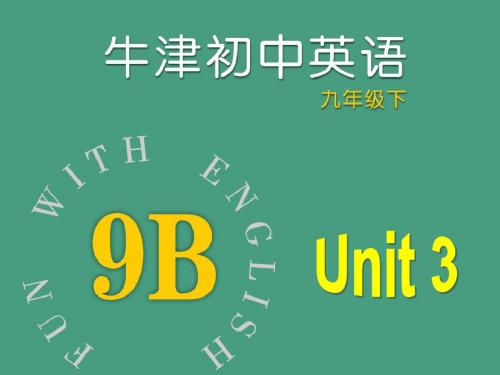
Jordan 约旦
Mongolia 蒙古
Israel 以色列
Bengal 孟加拉
Iran 伊朗
desert
valley
jungle
mountain
ocean
waterfall
Finish the dialogue.
deserts, jungles, mountains, ocean, valleys, Vietnam, waterfalls Millie: Hi, Simon, do you like travelling a lot? Simon: Yes. I’ve been to many places such as (1) deserts . It’s really difficult to find water there.
Millie: It’s a pity that we can’t go to that far place. Simon: Well, you can go to Guizhou Province. You can travel in the jungle and waterfalls find many beautiful (4) . Millie: That sounds great! What do you think the best place to go is? Simon: I think it is Sichuan Province. I love the (5)mountains and (6)valleys there.
Millie: Where would you like to go next time? Simon: I hope I can go sailing in the (7) ocean .
江苏省永丰初级中学:Unit 3 Asia (ntegrated Skills)课件(牛津译林版九年级下册)
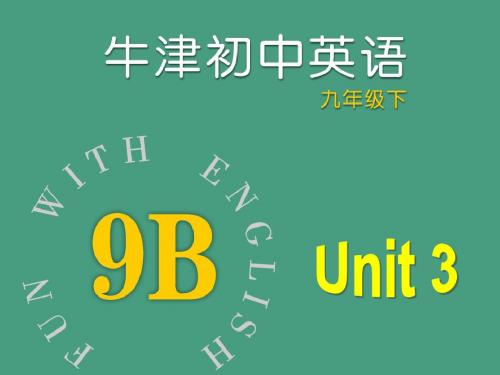
Day 1: 25th May
arrive in Tokyo, the capital city
Day 2: 26th May Day 3: 27th May Day 4: 28th May
visit Mount Fuji, Japan’s highest mountain visit the Imperial Palace in Kyoto leave Japan for other Asian countries
Free talk
A: Which countries do you want to go on holiday in the world? B: I’d like to … A: What places of interest do you want to visit? B: I’d like to visit … A: What do you think of them? B: Because …
Tokyo It is First, they will visit (3)______. Japan’s capital city. They can go (4) shopping and (5) __________ sightseeing there. ________ Their head teacher, Miss Thompson, will also take them to the (6)______________________ Tokyo National Museum to see some (7)____________. Japanese art
Learn about Japan
the Imperial palace
Mount Fuji
苏教牛津译林版初中英语九年级下册《Unit 3 Asia》Vocabulary教学案

苏教牛津译林初中英语重点知识精选掌握英语语法知识,巩固词汇量和各种语态,学好英语基础一定要扎实,大家一起练习吧!牛津译林初中英语和你一起共同进步学业有成!Unit 3 Asial flagsand try to use thempaying4. C_______(ride a bike) around Guilin is great fun.5. It’s an interesting __________(经历6. China has sent up several m________(3. I think my grandmother is a woman of great __________(wise).( ) 2. It is very difficult to tal k. There is ______ noise.A. much tooB. too manyC. too muchD. too few ( ) 3. There are ______ museums in Guilin.( ) 5.--You should put drinks near ______ computer.( ) 1. –Mr Johnson asked me to remind you of the mee afternoon. Don’t forget it. ---Ok. I__________A. won’tB. don’tC. willD. doIt was-- I will go to see you when you _______ the training course.A. finishedB. finishC. are finishingD. will finish译句子。
皇帝们过去常住这儿。
The _________ _________ __________ live here.在地下岩洞里有许多怪异的美的岩石。
牛津译林版英语九年级下册《unit 3 asia》grammar特色优秀教案(重点资料).doc
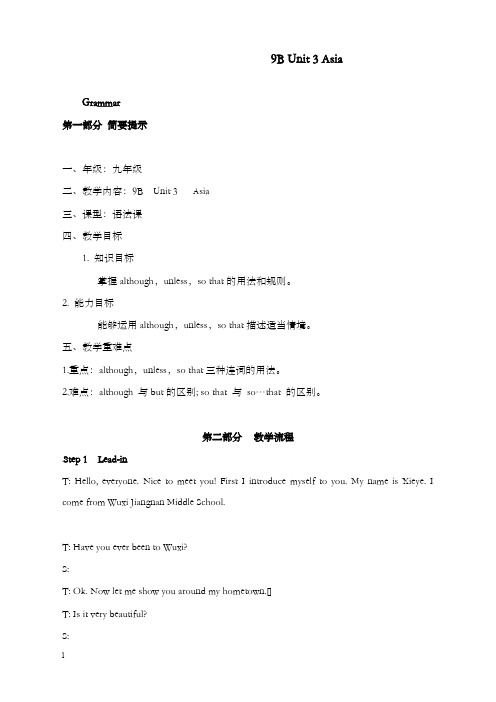
9B Unit 3 AsiaGrammar第一部分简要提示一、年级:九年级二、教学内容:9B Unit 3 Asia三、课型:语法课四、教学目标1. 知识目标掌握although,unless,so that的用法和规则。
2. 能力目标能够运用although,unless,so that描述适当情境。
五、教学重难点1.重点:although,unless,so that三种连词的用法。
2.难点:although 与but的区别; so that 与so…that 的区别。
第二部分教学流程Step 1 Lead-inT: Hello, everyone. Nice to meet you! First I introduce myself to you. My name is Xieye. I come from Wuxi Jiangnan Middle School.T: Have you ever been to Wuxi?S:T: Ok. Now let me show you around my hometown.[]T: Is it very beautiful?S:T: Of course.Although Wuxi is not very big, it’s famous as the town of fish and rice in China.It’s famous as the town of fish and rice in China although Wuxi is not very big.T: There are a lot of snacks in Wuxi.Unless you taste the traditional snacks, you will feel sorry.You will feel sorry unless you taste the traditional snacks.T: Welcome to my hometown.You’d better visit my hometown in the summer holidays so that I can have free time to show you around.Step 2 Grammar A Using ’although’Part One PresentationT: There’re a lot of beautiful cities in China. Let me show you some pictures.T: Where is it?S:T: That’s right. It’s Beijing. It’s the capital of China and it is a very big city. Look at the picture. Where is it?S:T: Very good. It’s the Forbidden City. It’s almost 600 years old but it’s still very beautiful. Although the Forbidden City is almost 600 years old, it is still very beautiful.It is still very beautiful although the Forbidden City is almost 600 years old.T: Look at another picture. Where is it?S:T: Excellent.It is very tiring to climb it step by step but you can experience its beauty and greatness.T: Can you give me another way of saying the sentence using ‘although’?S:T: Very good. We can also say,Although it is very tiring to climb it step by step, you can experience its beauty and greatness. You can experience its beauty and greatness although it is very tiring to climb it step by step.T: We can use ‘although’to join two parts of a sentence. Each part has an opposite idea. ‘Although’has a similar meaning to ‘but’. Howe ver, we never use ‘but’in a sentence with ‘although’.Part Two PracticeT: All right. There’re many places of interest in Beijing. Last summer holiday, I traveled to Beijing. I had a good time, but Mr. Wu didn’t enjoy his trip to Singapore last year. Let’s help find out why. Join the two parts of the sentences by using ‘although’on Page 47.1.it rained heavily / it was still hotAlthough it rained heavily, it was still hot.It was still hot although it rained heavily.2.I got hot and sweaty / I walked slowlyAlthough I walked slowly, I got hot and sweaty.I got hot and sweaty although I walked slowly.3. there was a train every five minutes / it was still very crowdedAlthough there was a train every five minutes, it was still very crowded.It was still very crowded although there was a train every five minutes.4. I still got lost / I read my map carefullyAlthough I read my map carefully, I still got lost.I still got lost alt hough I read my map carefully.5. I ate healthily every day / I got illAlthough I ate healthily every day, I got illI got ill although I ate healthily every day.6. I still felt very tired / I slept wellAlthough I slept well, I still felt very tiredI still felt very tired although I slept well.7. people there were friendly / I missed BeijingAlthough people there were friendly, I missed BeijingI missed Beijing although people there were friendly.Part Three Rule outT: Now, let’s work out the rule. If we use ‘although’at the beginning of a sentence, we need to put a comma (full stop, comma ) between the two clauses.Step 2 Grammar B Using ‘unless’Part one PresentationT: That’s Mr. Wu’s trip to Singapore. It’s unpleasant. What about Millie’s? Millie wants to visit Beijing. She thinks,“If you do n’t see them with your own eyes, you cannot imagine how amazing they are.”Unless you see them with your own eyes, you cannot imagine how amazing they are.You cannot imagine how amazing they are unless you see them with your own eyes.T: Another example:If you do n’t have a map, you will get lost easily.T: Can you give me another way of saying the sentence using ‘although’?S:T: Very good. We can also say,Unless you have a map, you will get lost easily.You will get lost easily unless you have a map.T: We can use ‘unless’to link two parts of a sentence. It has a similar meaning to ‘if…not’. It is used to say that something can only happen or be true in a particular situation.Part Two PracticeT: Now, turn to Page 48. Let’s do exercises. Millie has made a tour guide. However, she tor e the guide into pieces by accident. Help her put the guide together. Match the two parts of the sentences and write the correct letters.1.Unless you want to buy lots of souvenirs, we suggest you not taking a lot of money withyou.2.There is no need to get up very early in the morning unless you want to watch the raising ofthe national flag.3.Unl ess you are in a hurry, you do not need to take a taxi.4.Take a map of Beijing with you while traveling unless you have a guide or know Beijingwell.5.Unless the weather forecast says it is going to rain, you do not have to take an umbrella or araincoat with you.6.Do not miss the traditional snacks in Beijing, unless you do not like Chinese food.Part Three Rule outT: Now let’s look at the rul e. We can use ‘unless’at the beginning or in the middle of a sentence to talk about exceptional conditions.Step3 Grammar C Using ‘so that’Part One PresentationT: Now let’s look at the pictures. Where is it?S:T: Good. It’s Tiananman Square. Every day, many tourists gather here early in the morning so that they can watch the raising of the national flag.It was built with stones and bri cks in ancient times so that the northern border of the country could be protected. (PPT24)T: We use ‘so that ’to talk about the purpose of doing something. We usually use verbs such as ‘can’, ‘will’, ‘could’or ‘may’after ‘so thatPart Two PracticeT: Let’s read the conversation between Mrs. Wang and Millie on page 49. Please put the words in brackets in the correct order and join the two parts of each sentence with ‘so that’. (PPT25-26)1Mrs Wang: Does Kevin know any Chinese?Millie: Yes. He learnt some Chinese in the USA so that he can talk to people in Chinese.2Mrs Wang: Where are you going to show him around in Beijing?Millie: Well, I am taking him to some famous Hutongs around so that he can learn more about China.3Mrs Wang: Does he miss his family?Millie: Not very much. His parents often call him so that he will not miss them too much.4Mrs Wang: Is he interested in the sights in Beijing?Millie: Yes, I think so. He takes a lot of photos wherever he goes so that he can tell his family and friend about China.Part Three Rule outT: Now let’s look at the rule. We use so that (so …that, so that ) to talk about the purpose of doing something. We use so …that (so …that, so that ) to talk about the result of something.(PPT27)1.Computers are so helpful that we all like to use them.2.Daniel works so hard that he can catch up with the others.Part Four ExercisesT: Now .lets do some exercises about ‘although’, ‘unless’an d ‘so that’. Please use ‘although’, ‘unless’and ‘so that’to filling in the blanks.1. He didn’t stop working although he was ill.2.Put on your sweater so that you won’t catch a cold.3 You will fail unless you study hard.[Step4 HomeworkMake sentences using ‘although’, ‘unless’and ‘so that’. (PPT28)第三部分说明本课时是9B Unit 3的Grammar。
江苏省永丰初级中学九年级英语下册 Unit 1 Asia Period 3教案 (新版)牛津版

Unit 1 AsiaReading 2Teaching aimsTo revise vocabulary and expressions to describe Beijin and Guilin, at the same time, learn more new words and phrases.Teaching focus1. To revise vocabulary and expressions to des cribe Beijin and Guilin2. To guess meaning from contextDifficult pointsTo learn some useful expressions and use them in different contextTeaching procedures The second preparin g lessonsStep1 RevisionAsk the following question s:1) Who once lives in the Forbidden City?2) Why do m any tourists go to Tian’anmen Square early in the morning every day?3) Where is the Summer Palace?4) What is Wei Ke’s favourite attraction?5) Wh y was the Great Wall built in ancient times?6) Which province is Guilin in?7) Is Guilin in the north or south of China?8) Are there mountains and rivers in Guilin?9) How can you travel in Guilin?Step 2 Presentation1.Reading the Text, try to find out the phrases below and get the class to translate the phrases below.get lost used to dobe attracted by in the pastbe filled with consist ofall over the area in ancient timesstep by step in different shapestake a boat trip fill peopl e with surpriseat sunrise the raising of the national flag2. Reading the text , try to find th e follow ing sentences.1) The emperors in Ming and Qing Dynasties used to live here2) With wonderful buildings and art treasures inside, it is well worth a visit.3) Every day, many tourists gather there early in the morning, so that they can watch the raising of the national flag.4) It runs for over 6,000 kilometers across northern China,with watchovers every few hundred meters.5) It lies on the two sides of LiJiang River.6) In the north-west of beijing is The Summer Palace,a large achinese garden set in a natural landscape.Get the class to put the sentences into good Chinese.Step 3 PracticeDiscuss the following , and decide which passage are they belong to:1) located in the south of China2) emperors of the Ming and Qing dynasties lives here3) capital of China4) the Forbidden City has about 600 years’ history5) surrounded by mountains in different shapes6) located in the north of China7) lie on the two sides of Li River8) tourists can hire a bicycle to ride around the ci ty9) be praised as10)point upwards/hang down10) tourists come to see the Forbidden City, Tian’anmen Square and the Summer PalaceStep 4 language explan ationed to do/be used to doing/be used to do2.be well worth doing3.gather here and watch the raising of the national flag4.one of the wonders5.lie on two sides of6.stand in different shapes7.It’s also popular to do sth.Step 5 RetellingGet the Ss to retell the text according to the notesof the two cities Kevin made。
江苏省永丰县初级中学九年级英语下册 Unit 1 Asia Study skills教案 (新版)牛津版
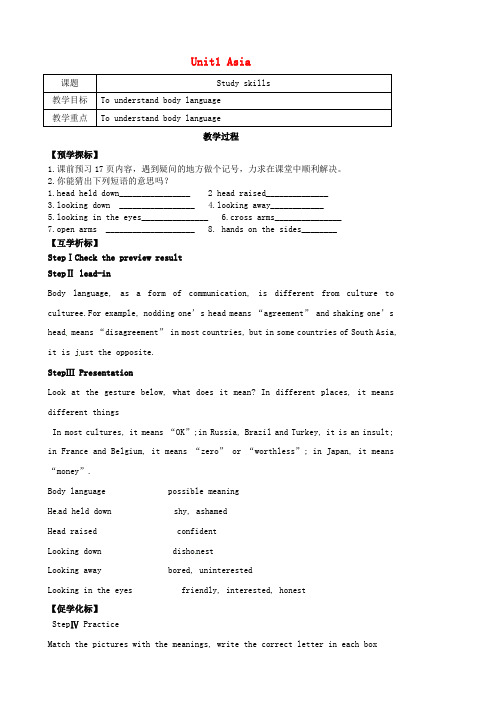
Unit1 Asia课题Study skills教学目标To understand body language教学重点To understand body language教学过程【预学探标】1.课前预习17页内容,遇到疑问的地方做个记号,力求在课堂中顺利解决。
2.你能猜出下列短语的意思吗?1.head held down________________ 2 head raised______________3.looking down _________________4.looking away____________5.looking in the eyes_______________6.cross arms_______________7.open arms ____________________ 8. hands on the sides________【互学析标】StepⅠCheck the preview resultStepⅡ lead-inBody language, as a form of communication, is different from culture to culturee.For example, nodding one’s head means “agreement”and shaking one’s head means “disagreement”in most countries, but in some countries of South Asia, it is j ust the opposite.StepⅢ PresentationLook at the gesture below, what does it mean? In different places, it means different thingsIn most cultures, it means “OK”;in Russia, Brazil and Turkey, it is an insult; in France and Belgium, it means “zero” or “worthless”; in Japan, it means “money”.Body language possible meaningHe ad held down shy, ashamedHead raised confidentLooking down disho nestLooking away bored, uninterestedLooking in the eyes friendly, interested, honest【促学化标】StepⅣPracticeMatch the pictures with the meanings, write the correct letter in each box【回学验标】What have you learned today? ——————————————————————————————————————【评学测标】Feedback一、用所给单词的正确形式填空。
九年级英语下册 Unit3 Asia Reading 教案 牛津译林版
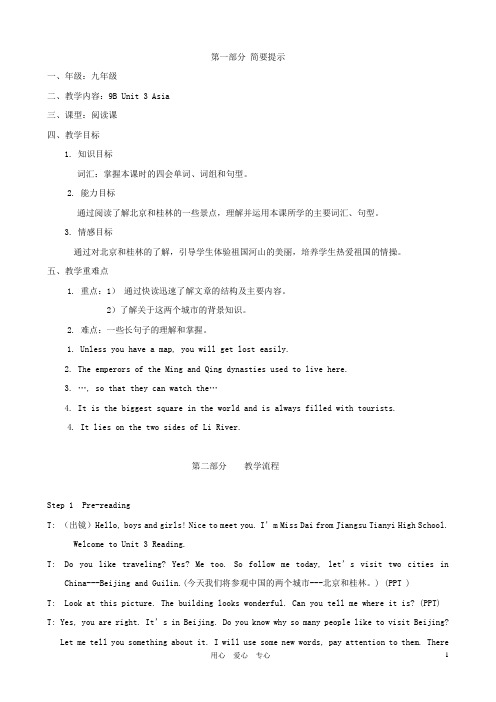
第一部分简要提示一、年级:九年级二、教学内容:9B Unit 3 Asia三、课型:阅读课四、教学目标1. 知识目标词汇:掌握本课时的四会单词、词组和句型。
2. 能力目标通过阅读了解北京和桂林的一些景点,理解并运用本课所学的主要词汇、句型。
3. 情感目标通过对北京和桂林的了解,引导学生体验祖国河山的美丽,培养学生热爱祖国的情操。
五、教学重难点1. 重点:1)通过快读迅速了解文章的结构及主要内容。
2)了解关于这两个城市的背景知识。
2. 难点:一些长句子的理解和掌握。
1. Unless you have a map, you will get lost easily.2. The emperors of the Ming and Qing dynasties used to live here.3. …, so that they can watch the…4. It is the biggest square in the world and is always filled with tourists.4. It lies on the two sides of Li River.第二部分教学流程Step 1 Pre-readingT: (出镜)Hello, boys and girls! Nice to meet you. I’m Miss Dai from Jiangsu Tianyi High School.Welcome to Unit 3 Reading.T: Do you like traveling? Yes? Me too. So follow me today, let’s visit two c ities in China---Beijing and Guilin.(今天我们将参观中国的两个城市---北京和桂林。
) (PPT )T: Look at this picture. The building looks wonderful. Can you tell me where it is? (PPT) T: Yes, you are right. It’s in Beijing. Do you know why so many people like to visit Beijing?Let me tell you something about it. I will use some new words, pay attention to them. Thereare many tour attractions in Beijing. (北京有许多名胜古迹) The forbidden city is very famous.Many emperors in different dynasties lived there. Every year, many visitors gather there to visit it.T: (PPT) There are some other attractions in Beijing, too.(北京还有许多别的旅游景点). Now look at this picture. Do you know what it is? Yes, it’s the Great Wall. It is one of seven wonders of the world. It is near the northern border of China. If you think it is tiring to climb it, you can hire a bike.T: (PPT)Can you remember the meanings of the new words? Now please look at them again and read after me:emperor dynasty forbidden gather wonder border hireWell done! Boys and girls! Do you want to know more about Beijing?T: If so, please open your books and turn to Page 42.Step 2 While-readingT: Beijing is a big city. In our books, we mainly talk about four parts of it. What are they?Please read the passage about Beijing and tell me the answers. (PPT)Yes. They are ‘the Forbidden City’, ‘Tian’anmen Squre’, ‘the Summer Palace’ and ‘the Great Wall’.Do you want to know more about the four places? OK, follow me, let’s visit the Forbidden City first. 超链接.T: Do you wan t to know more about the four places? OK, follow me, let’s visit the Forbidden City first. Listen to the first paragraph and answer the questions.T: (PPT) Read the first 2 paragraphs and find the right answers. ( 请同学们阅读前两段,从中找到正确的答案). 停顿.Now, let’s che ck the answer.1. The forbidden city is at the center of Beijing.2. The emperors of the Ming and Qing dynasties used to live there.3. It’s used as a museum now.4. What may be the attracting things to us?The beautiful buildings, the clothes and the furniture used in the past. 超链接T: (PPT) The second place we are going to visit is Tian’anmen Square. Would you please read the third paragraph and answer these questions? ( 停顿)Ok, tell me the answers now.1. What does the word ‘Tian’anmen’ mean? It means ‘a gate of heavenly peace’.2. Is it the biggest square in the world? Yes, it is.3. What can we watch there?We may watch the raising the national flag.4. What do the local people like to do there?They like to take a walk and fly kites there. (超链接)T: Well done, boys and girls! Now let’s visit the third place, ‘ the Summer Palace’. Listen to the fourth paragraph and fill in the blanks. (PPT)The Summer Palace is located in the north-west of Beijing. It is a Chinese-style garden.The emperors used to spend the summer there. It is still beautiful and attractive for the hill and a man-made lake.T: (PPT) Boys and girls, have you got the right answers? Great! Congratulations! Do you want to visit the Great Wall? (你们想去长城一游吗?不到长城非好汉啊!) Now let’s go and havea look! (我们去看看吧!) Read Paragraph 5 and fill in the blanks.Can we check the answers now?The Great Wall runs more than 5,000 kilometers, and it was built with stones and bricks.The Great Wall was used to protect the country. It was one of the seven wonders of the world. It is very tiring to reach the top of the Great Wall step by step. (超链接)T: (PPT) Just now, we visited four different parts of Beijing. Do you still remember them?(你还记得关于它们吗?) Try to match the places with their descriptions(请把不同的地方和关于它们的描述搭配起来).T: Can we check the answers now?Yes. The Forbidden City is the place where the emperors used to live. Tian’anmen Square is the place where we can watch the raising of the national flag. The Summer Palace is the place where the emperors spent the summer. The Great Wall was used to protect our border in the past.T: (出镜)We all know that Beijing is the capital of China(我们都知道北京是我们的首都),it’s in northern China. (它在中国的北部)。
- 1、下载文档前请自行甄别文档内容的完整性,平台不提供额外的编辑、内容补充、找答案等附加服务。
- 2、"仅部分预览"的文档,不可在线预览部分如存在完整性等问题,可反馈申请退款(可完整预览的文档不适用该条件!)。
- 3、如文档侵犯您的权益,请联系客服反馈,我们会尽快为您处理(人工客服工作时间:9:00-18:30)。
Teaching goals 教学目标1. Target language 目标语言a. Words and phrases 生词和短语although, chopstick, kung fu, Chinese knot, paper cut, too many hills, continue to the end, takea rest, wake me up, on one’s way back, dragon danceb. Key sentence 重点句子Although the re’s still a long way to go, we’d better continue to the end.2. Ability goals 能力目标1) To study the usage of “although”.2) To talk about different countries in Asia.3) To learn some Chinese things.3. Learning ability goals 学能目标1) Make the students to learn more interesting places in China.2) Know the fact that they will succeed as long as they work hard.Teaching important & difficult points 教学重难点Help the students learn to introduce some famous things in Beijing in English.Teaching aids 教具准备The Multi-media and a tape recorder.Teaching procedures & ways 教学过程与方式Step I Lead-inTalking about the places of interest in Beijing.1. Show some pictures to the students. Get them to guess what it is.2. Encourage the students to describe them.Step II Listen and readTell the students that Eddie and Hobo are visiting the Great Wall.a. Get the students to listen to the tape and find out what happened.1)What happened to Hobo’s feet?2)What was he doing then?3)What did Hobo advise Eddie to do?4)What wa s Eddie’s decision?b. Read after the tape and then complete the short passage.One day, Hobo and Eddie ________ the Great wall. Hobo thought it was _______ to climb the Great Wall, but Eddie felt very ________. Hobo encouraged Eddie to _________ to the end, but Eddie decided to ________ a rest.c. Get the students to read and practice the dialogue and then act the dialogue out.(Encourage the students to add something to make the dialogue funnier.)Step III Explaining and practicea. Tell the students to translate the following expressions into Chinese.1. 长城是令人惊奇的2. 那儿有太多的山3. 休息一下4. 叫醒我5. 在你回来的路上b. although引导的让步状语从句:1) although相当于though, 两者都是连词,引导让步状语从句。
如:①Although/Though she’s young, she knows a lot.= She’s young, but she knows a lot.尽管她年龄小,她却懂得很多。
②Although/Though he is in poor health, (yet) he works hard.= He’s in poor health, but he works hard.虽然他身体不好,但他还是努力工作。
③I’ll never give up English though it is difficult.= English is difficult, but I’ll never give it up.虽然英语很难,但是我不会放弃的。
注意:①连词although和though引导让步状语从句,主句前不能再用but。
2) Say “Although there’s still a long way to go, we’d better continue to the end.” Can you use thesentence structure to make more sentences?3) Ask students to make sentences with “although”.Step IV PresentationGet to know the countries in Asia.1. Say “what country is east to China”.Show some pictures about the country. (Japan)2. Say “what country is northeast to China”.Show some pictures about the country. (Korea)3. Say “what country is north to China”.Show some pictures about the country. (Mongolia)4. Say “what country is southwest to China”.Show some pictures about the country. (India)Encourage the students to say something about these countries.Step V Showing and discussionGet to know Chinese things.1. Show the pictures about Chinese things such as: dragon dance, Chinese opera, chopsticks, Chinese knot, Chinese paper cut and Chinese kung fu.2. Encourage the students to talk about the pictures.3. Encourage the students to say more about Chinese things.4. Get the students to talk about some famous Chinese things.Step VI PracticeFinish the exercises in Part A.1. Get the students to finish the exercises in Part A and then check the answers.2. Help the students to say mo re about “Chinese opera, Chinese k ung fu”.3. Explain some of the language used here and help the students to understand.Step VII Pair workTalk about the places of interest in China.1. Show the students four pictures (Li River, the Bund, the Terracott a Warriors, Tian’anmen Square)2. Ask the students to talk about the four pictures: what can you see? what is it? where is it?3. Encourage the Ss to say more about Chinese interesting places.Step VIII Consolidation1. Play a game “Can you guess?” Ask st udents to describe places in China and guess the names.A. It is very beautiful, it is very clear; there are many different shapes of mountains along it.What is it? Where is it?B. There are many old beautiful houses in it. In the past, emperors and their families lived in it.Now, we can see many valuable pictures and clothes in it. What is it? Where is it?C. It is built over the mountains. It is built to protect the country and the people. Now it is thesymbol of China.2. Write a short passage to describe one of the famous places in China and choose a piece of writing to read in class.Step ⅨHomework1.Read words and expressions and the dialogues of the comic strip.2.Finish the exercises on the exercise book.3.Preview the reading passage.。
